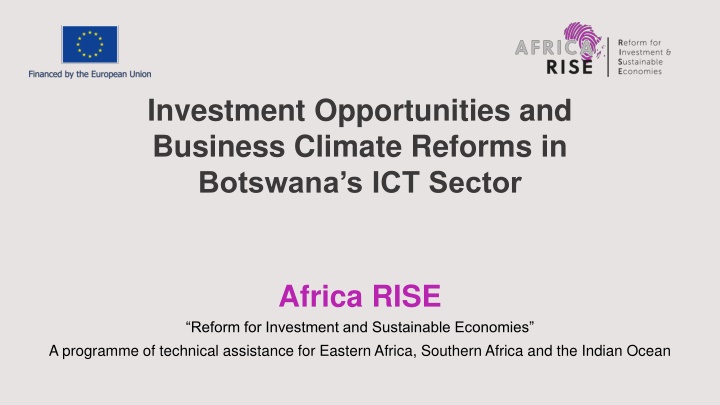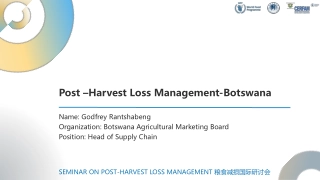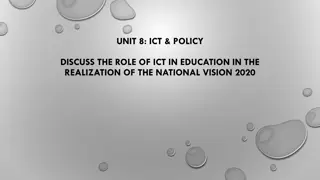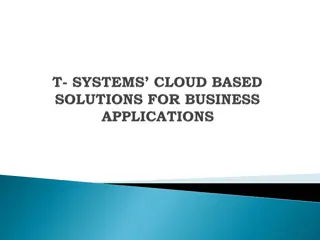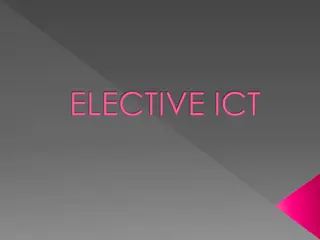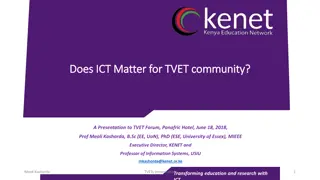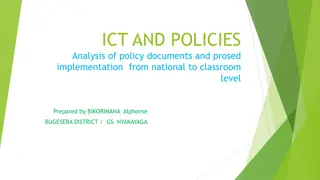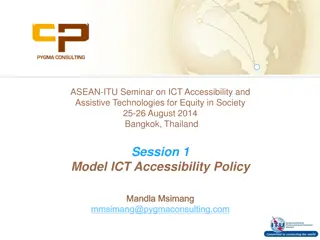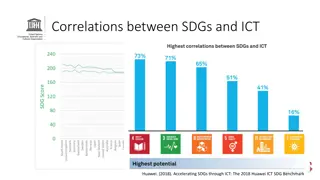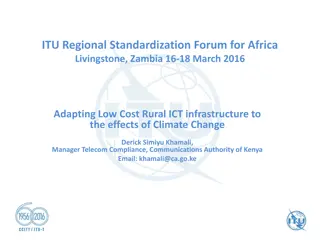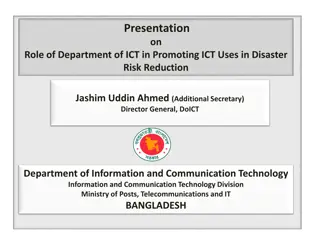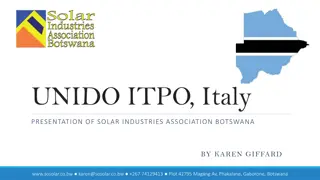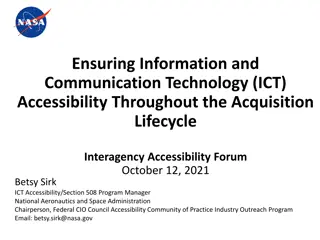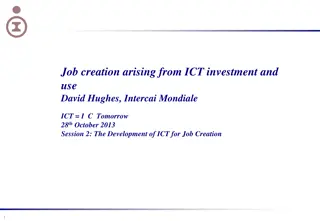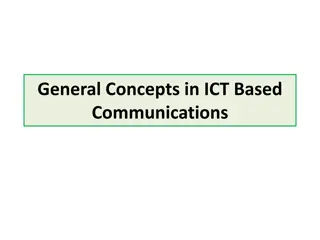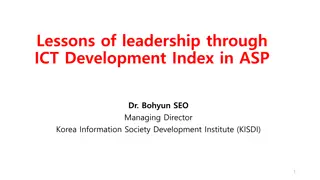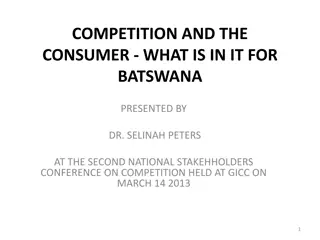Investment Opportunities in Botswana's ICT Sector: A Comprehensive Assessment
Building a vibrant ICT sector in Botswana requires strategic foresight and tactical implementation. Despite some advancements, the sector faces challenges like infrastructure gaps and limited talent pool hindering significant foreign direct investment. Benchmarking against SADC countries reveals areas for improvement in internet bandwidth costs, digital economy ranking, global innovation index, and more.
Download Presentation

Please find below an Image/Link to download the presentation.
The content on the website is provided AS IS for your information and personal use only. It may not be sold, licensed, or shared on other websites without obtaining consent from the author.If you encounter any issues during the download, it is possible that the publisher has removed the file from their server.
You are allowed to download the files provided on this website for personal or commercial use, subject to the condition that they are used lawfully. All files are the property of their respective owners.
The content on the website is provided AS IS for your information and personal use only. It may not be sold, licensed, or shared on other websites without obtaining consent from the author.
E N D
Presentation Transcript
Investment Opportunities and Business Climate Reforms in Botswana s ICT Sector Africa RISE Reform for Investment and Sustainable Economies A programme of technical assistance for Eastern Africa, Southern Africa and the Indian Ocean
EU Botswana Business Forum Presenter: Pablo Quiles, Manager of Trade Advisory Services, International Economics Consulting Ltd. Gaborone, Botswana - October 12, 2023 2
Introduction Building a vibrant Information and Communication Technology (ICT) sector is a complex, multifaceted endeavour requiring strategic foresight and tactical implementation. Key elements: Robust ICT infrastructure, Innovation Attractive business environment Successful public-private partnerships Leveraging its strengths. 3
ICT Sector Assessment The ICT sector is relatively advanced compared to other countries in the SADC region, except South Africa and Mauritius. The ICT industry needs to be realigned to maximise the use of sophisticated infrastructure for better corporate communication, increased access for citizens, and high-speed connectivity for national development (eGovernment). The presenceof a few major IT players and a relatively small talent pool hinder the growth of the sector to attract significant tech-based FDI. It is also often overshadowedbySouth Africa and viewed as an extension of its market, further restricting its growth. Further, South Africa also serves as a regional hub for many IT companies and FDI, making it difficult for Botswana to stand out. Infrastructure gaps exist, notably in last-mile connectivity, costs to end-users, and lack of access to soft infrastructures such as hubs and training programs outside urban areas. 5
Benchmarking Botswana selected ICT indicators in SADC No Metric Botswana Namibia South Africa 4.30 Mauritius Eswatini Zimbabwe Zambia Tanzania Mozambique Angola DRC Malawi Madagascar 1. 13.87 4.78 2.48 13.31 201 1.36 0.71 1.33 5.29 1.94 27.41 8.81 Internet Bandwidth Costs (US-Dollars)/Gb (2022) 2. 61 117 52 54 126 98 95 107 174 80 164 119 132 Digital Economy Ranking (UNCTAD, 2022) (179 countries) 3. 86 96 61 45 139 107 118 103 123 127 - - 106 Global Innovation Index (ranking 2022) [139 countries] 4. 70 74 52 72 126 118 113 143 125 144 155 119 120 Global Connectivity Report (Ranking, ITU , 2022) [79 countries] 5. 38.7 43.9 56.5 58.4 28.4 30.5 30 36.6 20.1 26.0 12.8 18 19.2 eCommerce Index (2022) (118 countries) 6. 0.5495 0.5322 0.735 0.7201 0.4498 0.4717 0.5022 0.4169 0.3130 0.3789 0.3675 0.3435 0.3565 eGovt Index (2022) (139 countries) 7. 3.10 2.90 3.70 2.50 - 2.50 2.53 2.99 2.68 2.10 2.50 2.59 2.30 Logistics Performance Index (2023) (57 countries) 8. 86 97 84 55 - 118 101 111 133 129 - 127 123 Digital Gaps Survey (2023) (134 countries) 9. 99 - 37.28 66 - 122 118 65 83 127 119 95 116 International Intellectual Property Index, 2023 10. 56.2 46.2 66.7 66.9 48.6 37.6 43.7 45.6 34.5 43.8 22.9 34.2 32.5 GSMA Mobile Connectivity Index, 2023 (170 countries) 6 *Excluding Lesotho, Comoros, and Seychelles
ICT Sector Assessment Botswana s sizeable geographic land mass with a highlydispersedpopulation in certain areas also requires large ICT, logistics and other forms of investment to ensure full national coverage, and this can pose a cost challenge for infrastructure development, including ICT. Botswana s relative small talent pool is also a constraint to e-commerce growth, and despite attempts to upgrade the national skills base, skilled labour remains in short supply. The economy is primarily government-driven, with the government being the country s major employer. There is a relatively small business sector outside of government procurement-generated business. Many potential investors express concerns about the market size, which impacts their decision-making process. Further, the presence of numerous suppliers in the market creates fiercecompetition and makes it difficult for new players to enter and establish themselves. 7
ICT Sector Assessment It is hard to obtain start-up finance, and there are few business incubators and limited numbers of individuals and businesses supported through government financing programmes. Botswana s ICT-centric innovation ecosystem is currently at an early stage of development, with significant needs noted in support networks, experienced human capital, and talent. The market scapacity to absorb ICT products is limited by usage, income, and awareness. Entrepreneurship should be refocused on domesticneedsandissues, strengthening domestic ICT usage and awareness, and bringing value to more sectors of the economy. Source: NATIONAL ICT POLICY REVIEW AND E-COMMERCE STRATEGY FOR BOTSWANA 8
ICT Investment Opportunities 9
Investment Climate Overall, Botswana has a relatively high level of investment readiness. The country offers a stable political environment, well-developed infrastructure, proximity to large regional markets, and a relatively well-educated workforce. Inbound direct investment to Botswana for 2020 was $5.1 billion. However, FDI inflows have been highly volatile, and in recent years, there has been a decline in investment, primarily due to the global economic slowdown and declining demand for Botswana's key exports. Business Environment Risk Political Risk Economic Risk V. Low V. High V. Low V. High V. Low V. High 10
Sectors Selected Business Process Outsourcing Computer and Cloud Services Data Centres E-commerce Application Services Web Design Services 11
Key Services in Botswana Customer support BPOs: Market Overview Call centre operations Customer service Technical support Worldwide USD 330 billion Revenue of the industry in 2022 USD 450 billion Forecasted Revenue by 2027 6.4% CAGR between 2022-27 IT services Software development IT consulting IT support services Global market dynamics Growth Value Forecast Back-office operations Very High High Very High SADC Market Growth Data entry Data processing Data analysis services. Value Openness Low Medium High 12
Data Centres: Market Overview A number of data centres already exist in Botswana, providing services such as colocation, cloud computing, and disaster recovery. However, the data centre market in Botswana is still in its early stages of development, with room for growth and expansion. There is an opportunity for telecommunications operators to build data centres in Botswana to serve central Africa, offering a comprehensive portfolio of data centre services such as cloud services and software as a service for enterprise applications such as e-commerce. Next steps: ratify the protection bill. A data protection bill may incentivise may businesses, such as banks to locate their data locally in Botswana or sign rigorous agreements to secure client data retained in South Africa. Worldwide USD 410.4 billion Forecasted Revenue by 2027 USD 321.4 billion Revenue of the industry in 2022 5.0% CAGR between 2022-27 Global market dynamics Growth Medium Value High Forecast High SADC Market (including Botswana) Value High Growth Medium Openness High GDPR-inspired data 13
Cloud Computing: Market Overview Worldwide Overall, the cloud computing sector in Botswana is still in its early stages of development, but has the potential to play a significant role in the country's digital transformation and economic growth. USD 881.9 billion Forecasted Revenue by 2027 USD 414.8 billion Revenue of the industry in 2022 16.3% CAGR between 2022-27 Cloud computing services have been gradually gaining traction in Botswana, with both private and public sectors increasingly technology to improve their operations. There are a number of local and international cloud service providers that operate in Botswana, offering a range of services including IaaS, PaaS, and SaaS. Global market dynamics adopting the Value Growth Forecast Very High High Very High SADC Market (including Botswana) Value Growth Openness Medium Medium High 14
Web Design: Market Overview The web design services market in Botswana is still in its early stages of development, but it is growing rapidly, driven by the increasing demand for a strong online presence among businesses in the country. Worldwide USD 106.4 billion Forecasted Value by 2027 5.7% CAGR between 2019-27 USD 67.4 billion Value in 2019 There are severalcompanies in Botswana offering web design services, including both local firms and international providers. Global market dynamics Growth High Value Medium Forecast Very High Some firms operating in this area are Virinc Solutions (PTY) Ltd, Keiko Tech, Hubcore, Dreamteam Data Pty Ltd, Cloud Consulting Botswana and App Space Group. SADC Market (including Botswana) Value Medium Growth Medium Openness High 15
E-Commerce Application: Market Overview In Botswana, e-commerce application services are mainly provided by software suppliers, although local IT firms may not have the capacity to offer support for packaged software. IT firms in the country can benefit from learning from experienced service delivery companies. Worldwide USD 25.7 billion Forecasted Value by 2027 12.3% CAGR between 2019-27 USD 11.7 billion Value in 2020 There is also a demand for USSD codes for services such as bank transactions, local authority payments, video on-demand, and music payments. Global market dynamics Growth High Value Medium Forecast Very High However, e-commerce application services are still in the developing stage in Botswana. Although there has been growth in recent years, the e-commerce market is not yet as mature as in other countries. SADC Market (including Botswana) Value Medium Growth Medium Openness High 16
ICT in Botswana: UVP Presence of multinational firms: brings in global expertise and investment into the country. Growingdomesticdemand for BPO services & Financial Services Centre (BPO). Emergence of new companies in the domestic sector showcases Botswana's growing capacity to support and nurture local businesses (Cloud Service Industry) Significant uptake of ecommerce within the country, highlighting a growing digital market and consumer demand for online shopping (Web design & E-commerce applications) SmartBots initiative aims to establish robust cloud computing infrastructure to support data centre operations and technological advancements in the country. Domestic data centres underscores Botswana's commitment to building a strong foundation for the Data Centre Industry. Availability of skilled professionals, well-equipped to manage and maintain these critical data infrastructure facilities. Botswana's proactive uptake of advanced IT applications reflects its dedication to staying technologically current.. Gaborone Mixed Economic Zone
Concluding Remarks Botswana's economy has been growing steadily, with a well-educated workforce, good infrastructure, and a stable political environment making it an attractive destination for foreign investment in Africa, particularly in the ICT sector. However, challenges remain, such as a small domestic market, limited financing for SMEs, slow bureaucratic procedures, restricted foreign investment, inconsistent enforcement of IPRs, and a dependence on South Africa. Botswana's small domestic market also makes it vulnerable to changes in global demand and fluctuations in commodity prices. Policymakers need to prioritize the country's digital competitiveness. The ICT services industry in Botswana faces challenges such as low-priced public services, high data costs, and the need for collaboration with other investment institutions. 18
Thank You 19
